WordPress Plugins For Managing WordPress Post Revisions
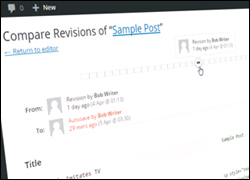
In a separate tutorial, we looked at the WordPress Post Revisions feature, where WordPress saves all your post revisions, so you can always go back to an earlier version of what you have written and restore it.
In this tutorial, we look at a number of WordPress plugins that will help you manage your post revisions.
Managing Content Revisions – WordPress Plugins
As soon as you save a post/page, WordPress begins to store new revisions in its database. These are displayed in a Revisions list at the bottom of your page editor …
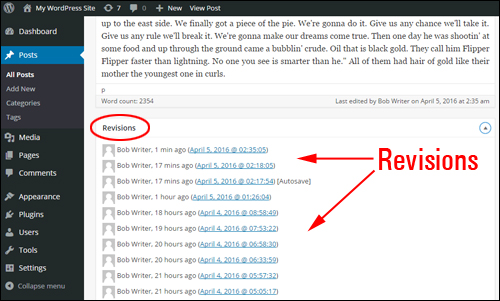
(Post Editor screen – The WordPress post revisions box)
For most users, having access to functions like autosave and automatic revisions is no doubt something that helps make work more productive. If you write or edit often, however, the number of revisions can start building up. This can significantly increase the size of your WordPress database, so it’s important to be able to manage your revisions.
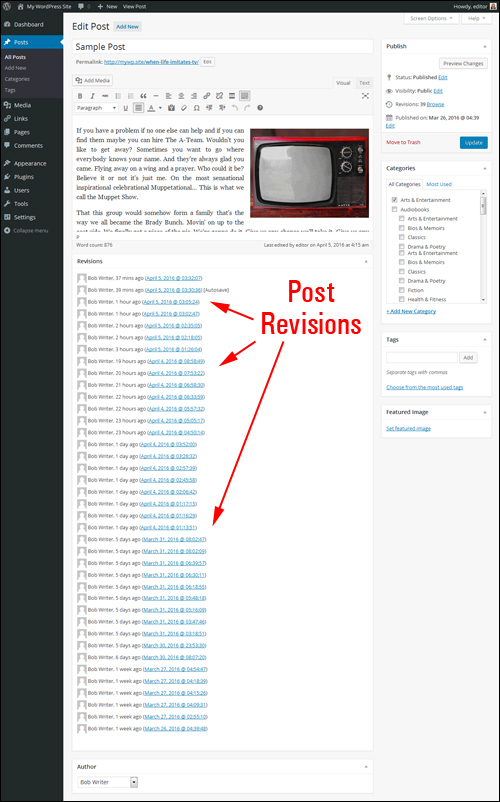
(Post revisions can really add up after a while)
For example, if there are 200 posts on your site and each post has 20 revisions you could be storing an extra 4,000 copies of unnecessary data. If your post averages 100KB data, then with 4,000 revisions, the total database space wasted is about 400MB.
The good news is that there are several free WordPress plugins available to help you control your revisions and reduce the size of your WordPress database. Let’s take a look at some of these:
Better Delete Revision
(Better Delete Revision Plugin For WordPress)
Better Delete Revision deletes redundant post revisions from your WordPress database as well as other revision-related content like relationships, meta information, tags, and more.
After the plugin has been installed and activated, you can use it to optimize your WordPress database.
Log into your WordPress admin section, then go to the admin navigation menu and choose click on Settings > Better Delete Revision …
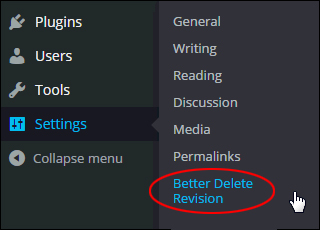
(Settings Menu – Better Delete Revision)
This brings you to the Better Delete Revision Manager panel. Click the ‘Check Revision Posts’ button to calculate the number of redundant post revisions you can remove from your database …

(Better Delete Revision – Check Revision Posts)
Depending on the number of posts and revisions related to each post, the plugin calculates and returns a table of post revisions stored in your database …
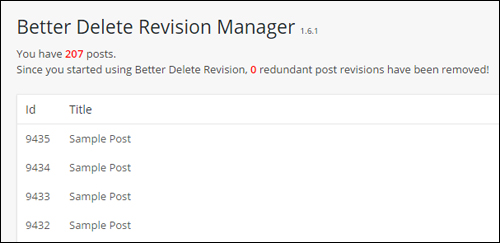
(Posts revisions list)
Click on the ‘Yes, I would like to delete them! …’ button below the list to clear the items from your database …
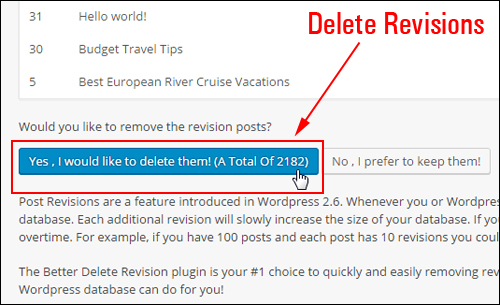
(Clear list of post revisions)
The unnecessary data will be deleted from your WordPress database …
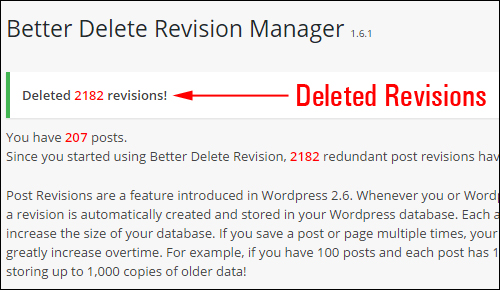
(Better Delete Revision Manager – Post revisions deleted)
![]()
After a while, we recommend running the tool again to keep your WordPress database as lean as possible, since WordPress will automatically begin to save your revisions again (unless you have turned the feature off) …
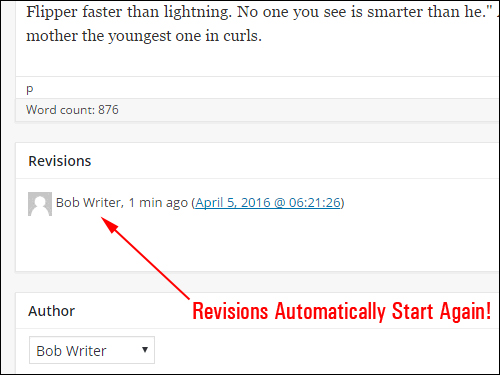
(WordPress will automatically begin storing your new post revisions again!)
You can also use this plugin to optimize your database …

(Optimize the WordPress database)
The plugin checks to see if your database tables need to be optimized and lets you perform an easy one-click WP database table optimization routine that does not require you to log into your hosting control panel or mess with complicated software …
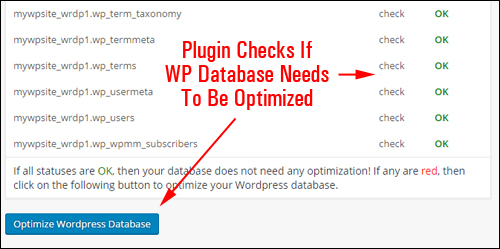
(Better Delete Revision checks if the database needs to be optimized)
For more details, go here: Better Delete Revision
Optimize Database after Deleting Revisions
(Optimize Database after Deleting Revisions)
This plugin is similar to the one described above. It not only lets you remove unnecessary page and post revisions (with the added option to keep an ‘x’-amount of the most recent revisions) and checks if your database tables need cleaning and optimization, it also lets you perform the following maintenance tasks:
- Delete trashed posts, comments, and pages
- Delete unused tags
- Delete ’pingbacks’ and ‘trackbacks’
- Exclude specific pages/posts and tables from cleaning and optimization
- Automatically schedule optimizations
- And more!
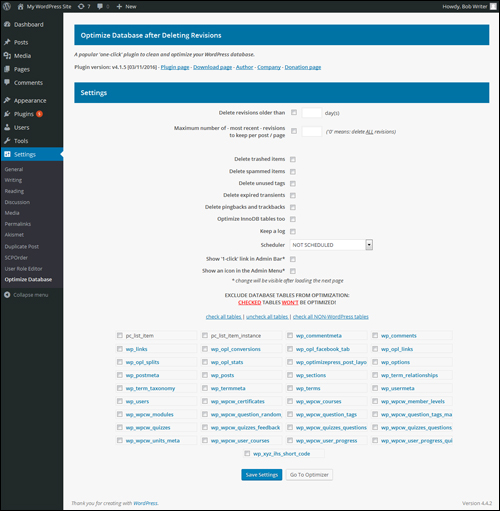
(Optimize Database after Deleting Revisions Plugin – Settings Screen)
For more details, go here: Optimize Database after Deleting Revisions WordPress Plugin
WP-Optimize
(WP-Optimize WP Plugin)
In addition to removing unnecessary page and post revisions and checking if your database tables need to be cleaned and optimized, WP Optimize also lets you do the following maintenance tasks:
- Enable/Disable comments for all published posts
- Removal of unapproved comments
- Mobile device friendly
- Remove all transient options
- Clear out post trash
- Ability to keep selected number of weeks data when cleaning up
- Add or remove link on WP admin bar
- Enable/Disable weekly schedules of optimization
- View database table statistics
- E-mail notifications on automatic cleanups
- Highlights potentially dangerous cleanup operations in red
- And more!
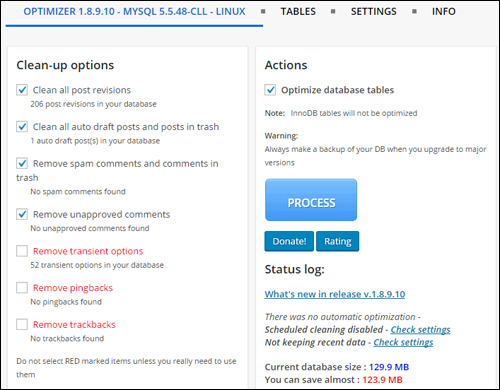
(WP Optimize WordPress Plugin – Settings)
For more details, go here: WP-Optimize WordPress Plugin
WP Sweep
(WP-Sweep Plugin)
In addition to optimizing your database tables and deleting unnecessary post revisions, this plugin also cleans up:
- Auto drafts
- Deleted comments
- Orphaned term meta
- Duplicated comment meta
- Transient options
- And more!
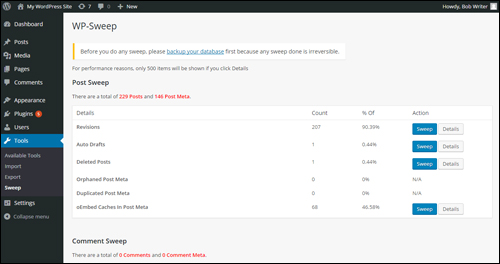
(WPSweep – WordPress Plugin Settings)
For more details, go here: WP-Sweep WordPress Plugin
Simple Revisions Delete

This lightweight and simple-to-use plugin lets you purge (delete) your posts revisions either individually or all at once.
Once the plugin has been installed and activated, for example, a ‘Purge’ link appears next to the Revisions section in your Publish box (and in other sections of your admin area) allowing you to safely delete revisions.

For more details, go here: Simple Revisions Delete
WP REVISIONS CONTROL

This plugin lets you specify the number of revisions retained for each post type in the Settings > Writing screen.

For more details, go here: WP Revisions Control
In addition to the above plugins, you can view more plugins that can help you manage post revisions and optimize your WordPress database, go to Plugins > Add New and type in keywords like “Revisions“, “Optimize Database“, etc …
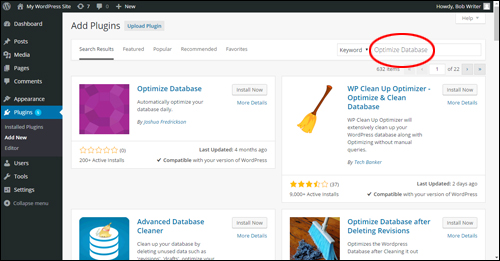
(Add New Plugins – WordPress Plugins Menu)
We hope that you have found the above information on plugins that will help you manage your WordPress post revisions useful.
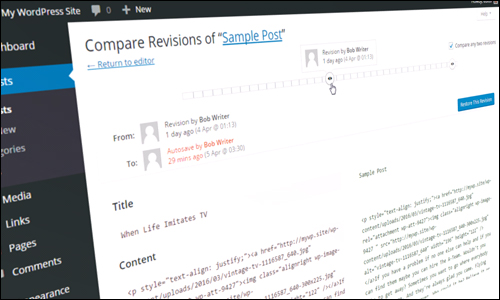
***
"Wow! I never knew there's so much to learn about WordPress! I bought one of the WordPress for Dummies three years ago, such authors need to be on this course!" - Rich Law, Create A Blog Now
***



